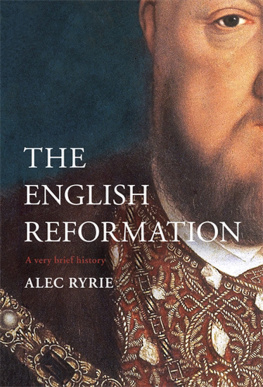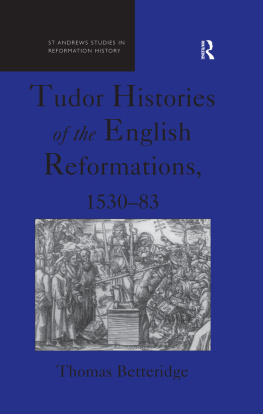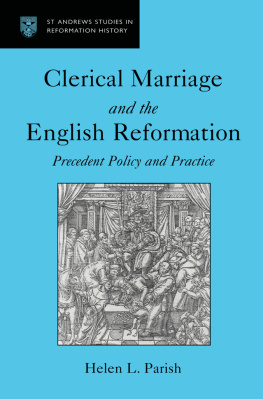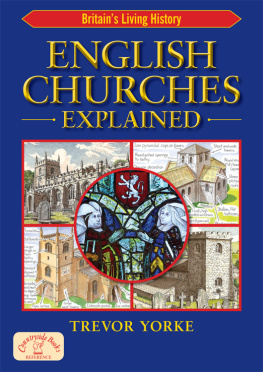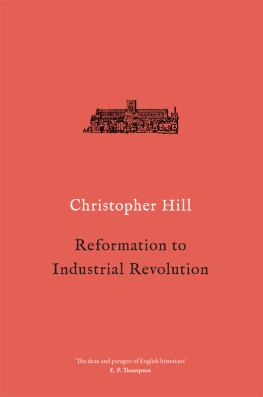The English Reformation 15301570
W.J. Sheils
First published 1989 by Pearson Education Limited
Published 2013 by Routledge
2 Park Square, Milton Park, Abingdon, Oxon OX14 4RN
711 Third Avenue, New York, NY 10017, USA
Routledge is an imprint of the Taylor & Francis Group, an informa business
Copyright 1989, Taylor & Francis.
All rights reserved. No part of this book may be reprinted or reproduced or utilised in any form or by any electronic, mechanical, or other means, now known or hereafter invented, including photocopying and recording, or in any information storage or retrieval system, without permission in writing from the publishers.
Notices
Knowledge and best practice in this field are constantly changing. As new research and experience broaden our understanding, changes in research methods, professional practices, or medical treatment may become necessary.
Practitioners and researchers must always rely on their own experience and knowledge in evaluating and using any information, methods, compounds, or experiments described herein. In using such information or methods they should be mindful of their own safety and the safety of others, including parties for whom they have a professional responsibility.
To the fullest extent of the law, neither the Publisher nor the authors, contributors, or editors, assume any liability for any injury and/or damage to persons or property as a matter of products liability, negligence or otherwise, or from any use or operation of any methods, products, instructions, or ideas contained in the material herein.
British Library Cataloguing in Publication Data
Sheils, W. J. (William J.)
The English Reformation: 15301570.
1. England. Christian Church. Reformation,
15091570
I. Title II. Series
274.206
ISBN: 978-0-582-35398-5 (pbk)
Library of Congress Cataloging-in-Publication Data
Sheils, W. J.
The English Reformation, 15301570.
(Seminar studies in history)
Bibliography: p.
Includes index.
1. ReformationEngland. 2. EnglandChurch history16th century. I. Title. II. Series.
BR375.S49 1989 274.206 88-13023
The Seminar Studies series was conceived by Patrick Richardson, whose experience of teaching history persuaded him of the need for something more substantial than a textbook chapter but less formidable than the specialised full-length academic work. He was also convinced that such studies, although limited in length, should provide an up-to-date authoritative introduction to the topic under discussion as well as a selection of relevant documents and a comprehensive bibliography.
Patrick Richardson died in 1979, but by that time the Seminar Studies series was firmly established, and it continues to fulfil the role he intended for it. This book, like others in the series, is therefore a living tribute to a gifted and original teacher.
Note on the System of References:
A bold number in round brackets (] refers the reader to the corresponding item in the section of Documents, which follows the main text.
We are grateful to the following for permission to reproduce copyright material:
Cambridge University Press for an extract from The Tudor Constitution by G. R. Elton pp. 4168 and the Folger Institute at the Folger Shakespeare Library for extracts from An Apology to the Church of England By John Jewel, ed. J. E. Booty, pubd. Cornell University Press 1963.
It has often been said that the Reformation changes of the 1530s amounted to an Act of State. No doubt the changes brought about by the Reformation Parliament reflected the determination of Crown, government and landed classes to reduce both the political power and landed wealth of the late medieval Church. This determination was given urgency by the Kings inability to secure Papal support for the annulment of his marriage to Catherine of Aragon, a marriage which had failed to produce the male heir thought necessary by Henry VIII to secure the Tudor dynasty. These motives were important springs to action, but even a government led by an administrator as able as Thomas Cromwell would not have been successful in carrying through its policy if an important sector of society did not share some of its ambitions. Contemporary evidence shows that in the early sixteenth century there was widespread dissatisfaction with the Church as it existed, and that this dissatisfaction was found among all sectors of society ().
In addition to the obvious abuses of wealth which brought criticisms from both landowners envious of monastic and other ecclesiastical estates ().
Paradoxically, another trend which led to criticism of the Church from some quarters was the resurgence in conventional).
The anti-clerical attitudes among the laity were recognised by a few churchmen as having some justification in fact. The most famous example of this is perhaps the sermon preached by the humanist and biblical scholar John Colet before the assembled Convocation of the province of Canterbury in 1511. This body, the representative assembly of the clergy of the whole archbishopric, had been summoned by Archbishop Warham to consider the problem posed by heresy. Colet, who was Dean of St Pauls, was chosen to preach the opening sermon and, in doing so, placed the blame for ignorance and heresy among the laity squarely on the shoulders of the clergy [).
).
Paradoxically, the humanists often saw the secular arm as being the instrument which would bring about the reform of the Church, the body of Christ. One of their chief inspirations was, of course, Erasmus, whose editions of the New Testament in Greek and Latin were influential in the English universities, where he had spent some time between 1511 and 1514 ().
These men, whether they sought reform of the Church by the Church like Colet, or reform by the Crown like Starkey, were the intellectuals of the day. Their criticism of the Church found a ready reception among the less high-minded of their contemporaries also and thus these intellectual movements lent support to popular anti-clerical attitudes which had always existed among various sectors of English society. The most striking and famous expression of these was A Supplication for the Beggars published by Simon Fish towards the end of the 1520s, a greatly exaggerated but powerful piece of invective against the clergy [], who wrote a reply to its charges, shows the strength of anti-clerical feeling in some quarters on the eve of the Reformation.
The forcefulness of Fishs claims and his vigorous style have perhaps been too successful, and the early sixteenth-century Church has not had a good reputation among historians. Having shown that there were demands for reform both within and without the Church we should now look briefly at the institution to see how far such criticism was justified. In doing so we can take as our starting point the four crucial failings identified by Colet in his sermon of 1511.
The career of Thomas Wolsey, a lowly-born cleric who became Archbishop of York, Cardinal and Papal Legate in addition to occupying several other wealthy church livings which he held along).
Such men comprised a large proportion of the parish clergy, almost half in the diocese of Canterbury in 1521, and 85 per cent in Hampshire in 1541. Conscientious they may have been, like John Greenwood at Heptonstall, learned they were not, but poor they certainly were. Only 8 of the 295 chaplains in Yorkshire in 1525 had an income greater than 5 a year, and in Staffordshire in 1541 the figure was 9 out of 166. Pluralism represented an unfair division of labour between a minority of very wealthy clergy and a majority of poor men who did most of the parochial work. From this structural flaw, critics maintained, negligence and immorality derived (, Zell).



